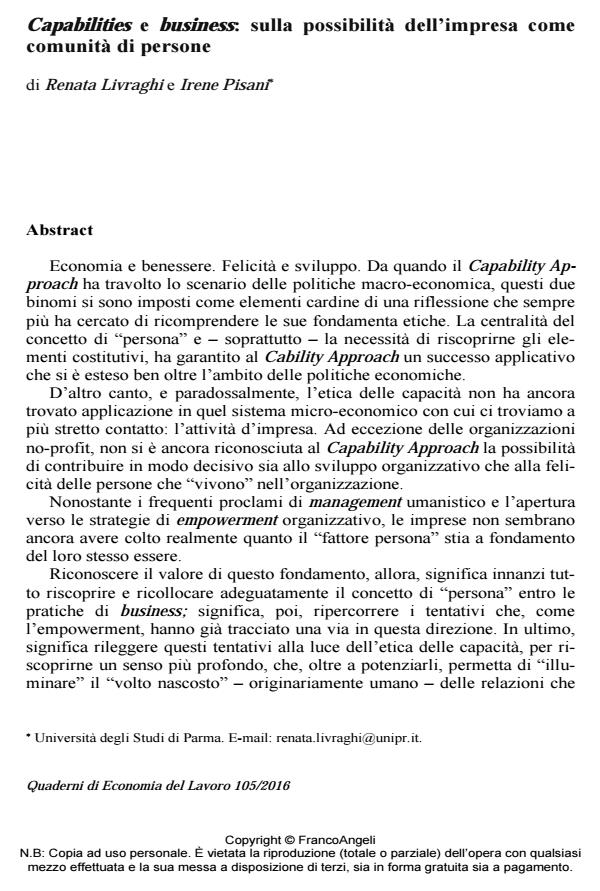Capabilities e business: sulla possibilità dell’impresa come comunità di persone
Journal title QUADERNI DI ECONOMIA DEL LAVORO
Author/s Renata Livraghi, Irene Pisani
Publishing Year 2017 Issue 2016/105
Language Italian Pages 47 P. 11-57 File size 324 KB
DOI 10.3280/QUA2016-105002
DOI is like a bar code for intellectual property: to have more infomation
click here
Below, you can see the article first page
If you want to buy this article in PDF format, you can do it, following the instructions to buy download credits

FrancoAngeli is member of Publishers International Linking Association, Inc (PILA), a not-for-profit association which run the CrossRef service enabling links to and from online scholarly content.
Economy and well-being. Happiness and development. Since the Capability Approach has engulfed the scenario of macro-economic policies, these two pairs have emerged as key elements of a reflection that increasingly has sought to encompass its ethical foundations. The centrality of the concept of "person" and - above all - the need to rediscover the elements, has guaranteed the cability Approach a successful application that has spread far beyond the scope of economic policies. On the other hand, and paradoxically, the ethics of capacity has not yet been applied at that micro-economic system in which we find ourselves more closely: the business entity. With the exception of non-profit organizations, it is not yet recognized the Capability Approach can make a decisive contribution both to organizational development that the happiness of the people who "live" in the organization. Despite frequent claims of humanistic management and openness to organizational empowerment strategies, businesses still do not seem to have really grasped what the "people factor" is at the foundation of their very being. Recognize the value of this foundation, then, it means first of all rediscover and adequately replace the concept of "person" within the business practices; means, then, trace the attempts which, as empowerment, have already blazed a trail in this direction. Finally, it means re-read these attempts at ethics light of capacity, to rediscover a deeper meaning, which, in addition to strengthening them, allows to "enlighten" the "hidden face" - originally human - relations that structure not only the strategies organization, but the organization itself.
- Trasformazioni, valori e regole del lavoro Gabriella Nicosia, pp.853 (ISBN:979-12-215-0507-8)
Renata Livraghi, Irene Pisani, Capabilities e business: sulla possibilità dell’impresa come comunità di persone in "QUADERNI DI ECONOMIA DEL LAVORO" 105/2016, pp 11-57, DOI: 10.3280/QUA2016-105002